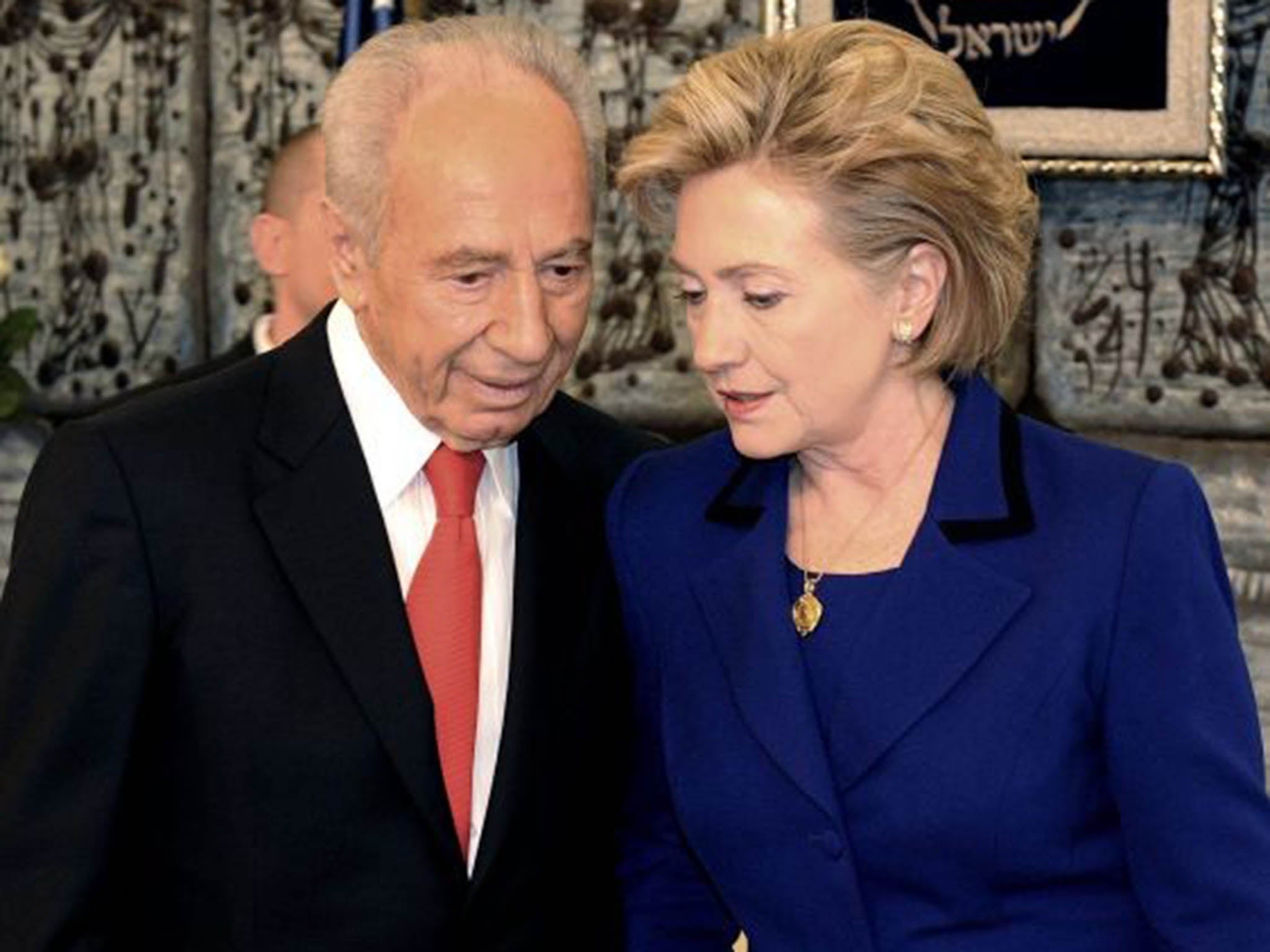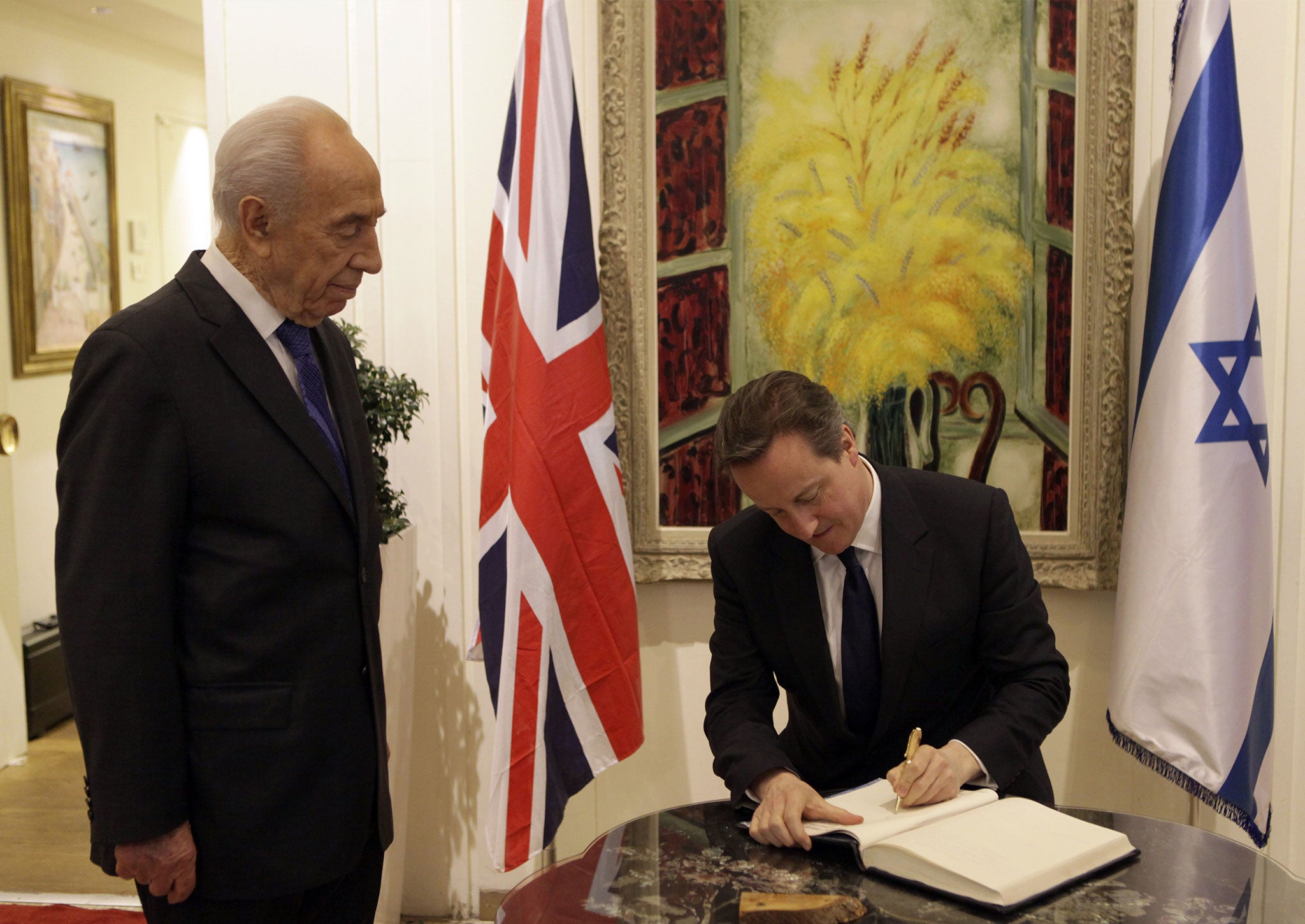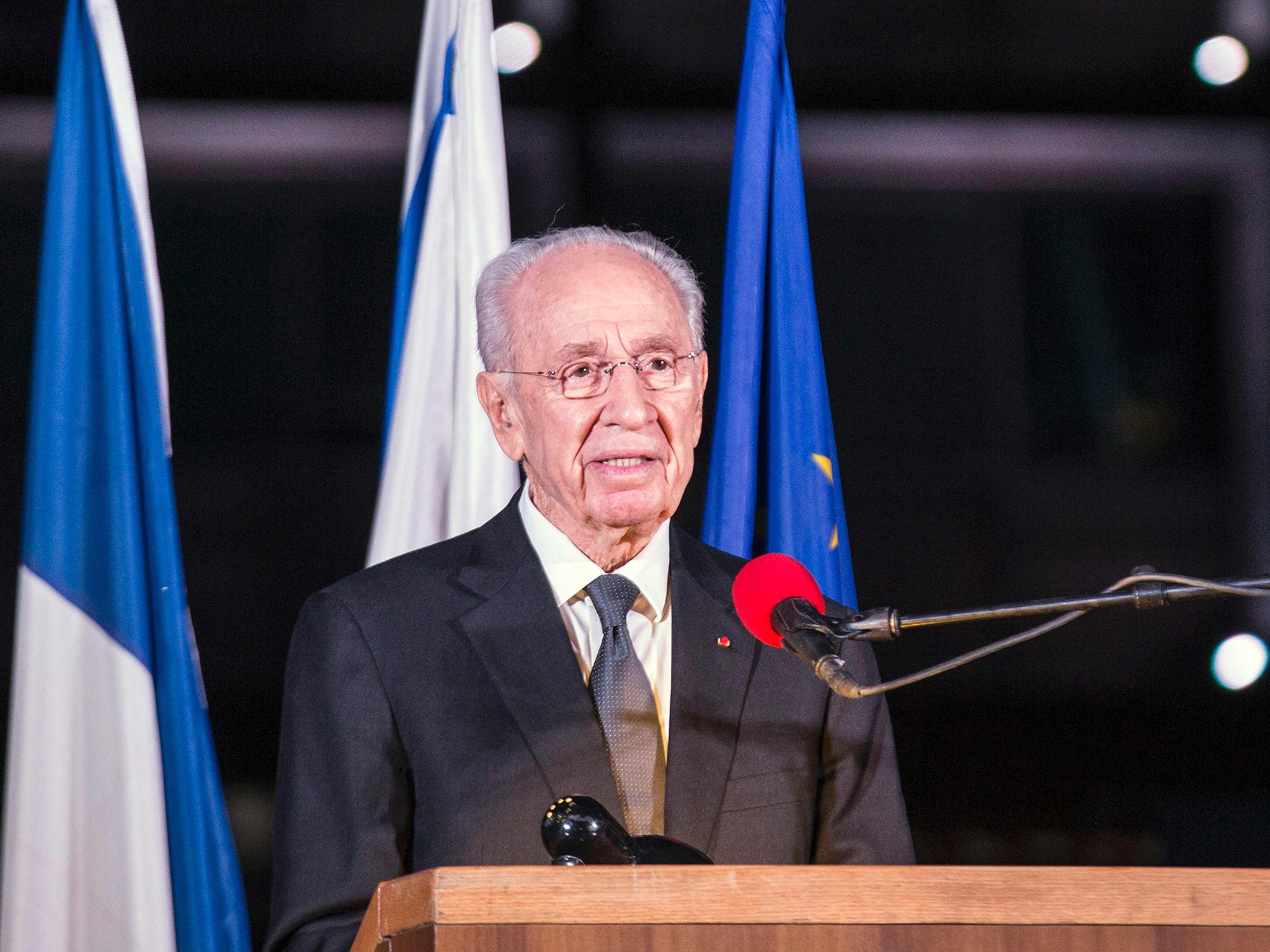Shimon Peres obituary: Nobel Prize-winning president and the last of Israel’s founding fathers
Peres was the one of Israel’s leading statesmen and led the efforts to create peace in the Middle East

Your support helps us to tell the story
From reproductive rights to climate change to Big Tech, The Independent is on the ground when the story is developing. Whether it's investigating the financials of Elon Musk's pro-Trump PAC or producing our latest documentary, 'The A Word', which shines a light on the American women fighting for reproductive rights, we know how important it is to parse out the facts from the messaging.
At such a critical moment in US history, we need reporters on the ground. Your donation allows us to keep sending journalists to speak to both sides of the story.
The Independent is trusted by Americans across the entire political spectrum. And unlike many other quality news outlets, we choose not to lock Americans out of our reporting and analysis with paywalls. We believe quality journalism should be available to everyone, paid for by those who can afford it.
Your support makes all the difference.Shimon Peres, who served as Israel’s ninth president from 2007 until 2014, is the only person to have held all four top jobs in Israeli governments: prime minister, foreign minister, defence minister and finance minister. Yet, even into his nineties, he was reluctant to go home and water his window boxes. He devoted all his adult life to getting things done. So long as there were tasks and challenges, he saw no reason to stop.
His health deteriorated two weeks ago, when he suffered a stroke. He died today at Sheba Medical Centre, surrounded by his family.
The 1993 Oslo Accords, the cornerstone of his vision of a New Middle East, failed to bring peace with the Palestinians, but he went on trying: talking to Arab leaders, hatching initiatives, promoting grassroots reconciliation through his peace foundation. In the Jewish tradition, I once wished him to live to 120. “Why,” he retorted, “should I be so modest?”
He never had it easy. As leader of the Labour party, he notoriously failed five times to win a commanding parliamentary majority. He fared well in opinion polls, badly at the ballot box. He was even beaten in 2000 by Moshe Katsav, a second-rank Likud politician, for the largely ceremonial presidency. But, as his friend the novelist Amos Oz put it: “Peres had a rare ability to recover from shattering defeats. He had the kind of stamina I don’t think I have seen in any other human being.”
The public tended to distrust him. They saw him as an intriguer, too selfish by half. Yitzhak Rabin accused him of treachery in the Seventies when Rabin was prime minister and Peres defence minister. In his memoirs, Rabin branded him an “indefatigable schemer,” and later denounced him for pulling a “stinking trick” in trying to topple Yitzhak Shamir, Labour’s Likud coalition partner, in 1990.
The labels became part of the political lexicon. But Peres was unabashed. “I am proud of it,” he told an Israeli interviewer. “I wish there more such schemers because then the ship would sail more quickly.”

He was a practical optimist, a statesman who believed not only that things would get better, but that they could be made to get better. He was a problem-solver, but one who shunned cozy compromises. Yossi Beilin, one of his protégés, said that Peres didn’t react to events, he tried to shape them.
Nimrod Novak, another backroom boy, testified: “Sometimes we, his advisers, preached a certain drastic measure, but he was always able to see more elements of the picture, to weigh conflicting interests, and in most cases to come up with a decision that in retrospect was clearly better.”
Peres went for bold solutions, like the 1976 rescue of 100 airline passengers held hostage by German and Palestinian hijackers at Entebbe airport. As prime minister in the mid-Eighties, he pulled most of Israel’s troops out of Lebanon and introduced radical economic reforms that slashed annual inflation from 400 per cent to less than 20. As Rabin’s foreign minister in the Nineties, Oslo was his ultimate coup.
He was not always a natural candidate for the Nobel Peace Prize he shared in 1994 with Rabin and Yasser Arafat, the Palestinian leader. He was a hawk before he was a dove. In the Fifties, as an aide to David Ben-Gurion, Israel’s first Prime Minister, he negotiated a secret agreement with Britain and France to invade Egypt after President Gamal Abdel Nasser nationalised the Suez Canal. He fathered Israel’s nuclear weapons programme, as well as its aircraft and armaments industries. He negotiated arms deals with France and Germany long before the United States became Israel’s main supplier.
As defence minister in the Seventies, he acquiesced in the establishment of Jewish settlements in Arab-populated hill areas of the West Bank in breach of his own party’s declared policy. In a reversion to type, he was an outspoken champion of Israel’s assault on Lebanon in July 2006.
Shimon Peres was born on 21 August 1923 to Yitzhak and Sarah Persky in the White Russian town of Vishneva, then under Polish rule. His father was a prosperous timber merchant. The young Shimon went to a Zionist school that taught in modern Hebrew. From his pious maternal grandfather, Zvi Meltzer, he inherited a lifelong passion for books and debate. The family migrated to British-ruled Palestine in 1934, settling in Tel-Aviv, where Yitzhak launched a struggling business. He served as a sergeant in the Eighth Army during the Second World War.
As a pupil at the Ben-Shemen agricultural boarding school, between Tel-Aviv and Jerusalem, Peres joined Hanoar Haoved, a Labour Zionist youth movement. He founded (and largely wrote) a literary magazine and made his mark as an accomplished organiser and public speaker. With a nucleus of Hanoar Haoved members, he trained for the pioneering life at Kibbutz Geva in the Jezre’el Valley, which he remembered in his autobiography as “stern and puritanical”.
The group left in 1942 to found Kibbutz Alumot, near the Sea of Galilee. It was there that Peres met and married Sonia Gelman, a shy introvert who resisted the spotlight throughout their married life. They had two sons and a daughter. But Levi Eshkol, a future prime minister, soon headhunted him as general secretary of Hanoar Haoved and he moved back to Tel-Aviv.
During the 1948 War of Independence, again under Eshkol’s patronage, Peres worked in arms procurement and ran a network of intelligence agents. In 1949, he was appointed to oversee the fledgling navy. “My naval experience,” he mocked later, “consisted of a moderate proficiency at breast-stroke and one childhood attempt to build a raft and launch if off the coast of Tel-Aviv.”
His bureaucratic war may have made the best use of his talents, but critics always taunted Peres for not having served in a combat unit. Despite his kibbutz credentials, it perpetuated his image as an outsider, an immigrant boy who never quite belonged and had to strive for recognition.

In 1953, Ben-Gurion, who was defence minister as well as prime minister, recruited him as director-general of the defence ministry. Ben-Gurion liked to foster able young men, as Peres himself did later. Moshe Dayan, still in uniform, was another of the team. Together they plotted with Britain and France before Suez. A year later, Peres signed an agreement to buy a nuclear reactor from France.
After being elected a Mapai (Labour) MP in 1959, he was appointed deputy defence minister. He persuaded Presidents John F Kennedy and Lyndon Johnson to end an American arms embargo and supply Israel with Hawk anti-aircraft missiles, Paton tanks and Skyhawk jet fighters.
When Ben-Gurion broke away from Mapai in 1965 and formed the more hawkish Rafi, Peres became the new party’s secretary. Dayan, who had retired from the army, joined them. But despite Ben-Gurion’s prestige, Rafi won only 10 seats in elections later that year. Peres fretted in opposition until the eve of the 1967 war, when he persuaded Eshkol, the Prime Minister, to appoint Dayan defence minister.
A year later, Peres led Rafi back into a merged Labour party. Over the next six years, he served successively as minister of immigrant absorption, transport, communications and information. When Golda Meir, the Prime Minister, and Dayan resigned after the setback of the 1973 Yom Kippur War, Peres was beaten for the Labour leadership by Yitzhak Rabin, who exploited a record of success as commander of the victorious forces in 1967 and as ambassador to the United States.

Rabin appointed him defence minister, but Peres was never reconciled to playing second fiddle. The prime minister accused him of constantly undermining him. Their rivalry, sometimes more intense, sometimes less, persisted through two decades. In their rancorous partnership, Rabin was generally the more cautious, Peres the more adventurous. It was Peres who pressed for the Entebbe rescue during the first Rabin government and for the Oslo Accords in the second.
Peres fought and lost his first election as Labour leader at short notice in 1977, after Rabin stood down when accused of maintaining an illegal foreign currency account. He lost again, more narrowly, to Menachem Begin in 1981. After another election ended in deadlock three years later, Peres became prime minister under a rotation deal with the right-wing Likud.
He reluctantly handed over the reins to Shamir, the Likud leader, in 1986. As foreign minister, he negotiated a secret peace agreement in London with King Hussein of Jordan, but the hard-line Shamir shot it down in flames. Peres never forgave him. After losing another election in 1988, he took the finance portfolio in a second national-unity coalition.
Labour was ready for a change. It gave Rabin another chance. He obliged by winning the 1992 general election. As foreign minister, Peres orchestrated the clandestine Oslo negotiations and made sure to get his full share of the kudos, on the White House lawn, where the historic deal was signed, and at the Nobel Prize ceremony.
After a right-wing fanatic shot Rabin dead in November 1995, Peres resumed the premiership. A surge of public sympathy seemed to ensure a Labour majority, and Peres was urged to call early elections. He delayed, however, and after a wave of Palestinian suicide bombings rocked Israeli cities Binyamin Netanyahu, the new Likud leader, defeated him by the slimmest of margins in May 1996. Peres explained afterwards that he had waited until Israel had cemented Oslo by transferring all the main West Bank cities to Palestinian rule. No future right-wing government would be able to turn back the clock.
Ehud Barak succeeded Peres as Labour leader a year later and went on to win the 1999 election. Peres’ career as a major player seemed to be over. Barak created a ministry of regional cooperation to keep him on side. But after Barak lost to Ariel Sharon in 2001 following the failure of his Camp David peace initiative and the outbreak of the Palestinian intifada, Peres bounced back as foreign minister in yet another unity government.
Benjamin Netanyahu became prime minster in 2009, serving under Peres, who remained president of Israel until 24 July 2014.
Shimon Peres, former Israeli prime minister, born Vishneva, Belarus (then Poland) 21 August 1923; married 1945 Sonya Gelman (divorced 2011), two sons, Yoni and Nehemia, one daughter Zvia Valdan; died Tel Aviv 28 September 2016.
Eric Silver, the author of this obituary, died in 2008. The article has been updated
Join our commenting forum
Join thought-provoking conversations, follow other Independent readers and see their replies
Comments